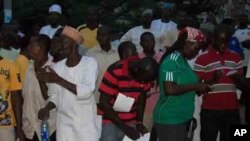An official of Nigeria’s Independent National Electoral Commission (INEC) said the body is “fully prepared” to hold this Saturday’s presidential election.
Nick Dazan, INEC’s assistant director of public affairs, said the electoral commission has begun distributing voting materials to all polling stations across the country in the run up to the vote.
“We have already received the ballot papers. And the various commissioners and the 36 states and the federal capital territory [Abuja] began to access the presidential ballot papers and to distribute them. So, we are set in that regard,” said Dazan.
He also said INEC expects more voters to participate in Saturday’s vote than in the parliamentary election held last week.
The presidential polls come after the failure of talks between the two leading opposition parties to unite against President Goodluck Jonathan’s candidacy. The parties’ spokesmen said the main leaders of the opposition, former general Muhammadu Buhari and anti-corruption activist Nuhu Ribadu, had failed to overcome “irreconcilable differences.”
Some analysts say despite a potentially stiff challenge from the opposition parties, incumbent President Goodluck Jonathan is favored to win Saturday’s vote.
Dazan said INEC has resolved the challenges it faced during the parliamentary vote, including the late delivery of ballot papers, and is looking forward to improved elections.
“The commission had an 8-hour marathon meeting with all the commissioners in the states. The meeting was used to review [last Saturday’s parliamentary] election and to look at the challenges, and also to look at how to overcome these challenges against the next sets of elections; the presidential election on April 16 and the governorship elections on April 26,” said Dazan.
He also said security agencies have intensified efforts to protect prospective voters in Saturday’s poll.
Meanwhile, partial results from parliamentary elections last Saturday indicate Nigeria's ruling party has lost ground, but will still keep its majority.
With more than 70 percent of the votes counted, the PDP has won 59 Senate seats compared to 32 captured by all the opposition parties. The ruling party has taken 140 seats in the House of Representatives, while the opposition has won 123.
An estimated 73 million Nigerians are eligible to vote.
Some international poll monitors described Nigeria’s parliamentary polls as an improvement over the 2007 general elections, which observers say was marred by fraud and intimidation.




